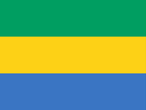
Call 0330 880 3600 Calls may be monitored or recorded. Opening Times.
- TRAVEL INSURANCE
- COVID-19 COVER
- More Options
- Help & Advice
- Existing Customers

Call 0330 880 3600 Calls may be monitored or recorded. Opening Times.

Need help?
UK Customer Services0330 880 3600*
Open Monday to Friday 9:00am to 6pm, Saturday 8:30am to 4pm and closed Sundays.
*Calls are recorded for training and quality purposes.

Official name: Gabonese Republic
Capital city: Libreville
Official language: French, Fang, Myene
Population: Around 2.4 million
Currency: Central African CFA franc (XAF)
Time zone: GMT+1
Driving side: Right
Climate: Equatorial, hot and humid with a long rainy season (February to May, September to December) and two drier periods
Gabon, located on the west coast of Central Africa, is a country of lush rainforests, diverse wildlife, and a growing eco-tourism sector. Known for its national parks, pristine beaches, and low population density, it is often described as one of Africa’s best-kept natural secrets. Libreville, the capital, blends French influence with African culture, while coastal and inland regions offer adventure, safaris, and unique biodiversity.
Gabon shares borders with Equatorial Guinea, Cameroon, and the Republic of the Congo, with the Atlantic Ocean to the west. Much of the country is covered in tropical rainforest, home to gorillas, forest elephants, and hundreds of bird species. The terrain includes coastal plains, mountains in the northeast, and savannah in the east and south. The Ogooué River is the main waterway, flowing across the country to the Atlantic.
Libreville International Airport serves as the main point of entry, with regional and some intercontinental flights. Domestic travel is possible by air, road, and rail, although infrastructure outside the capital can be limited. A railway connects Libreville with Franceville in the southeast, while buses and taxis are the main forms of local transport. Roads in rural areas may be poor, particularly in the rainy season, so overland travel requires preparation.
UK citizens require a visa to enter Gabon, which can be obtained online via an e-visa system for short stays. Passports must be valid for at least six months beyond the date of entry. A yellow fever vaccination certificate is mandatory. The British Embassy in Libreville closed in 1991; UK interests are represented by the French Embassy, though support can also be sought from the British High Commission in Yaoundé, Cameroon.
The Central African CFA franc (XAF) is the official currency, shared with several neighbouring countries. It is pegged to the euro. ATMs are available in Libreville and larger towns, and major hotels accept credit cards, but cash is still widely used. Costs can be high, particularly for imported goods and accommodation, though local markets are more affordable.
Healthcare in Gabon is limited outside Libreville and Port-Gentil, where facilities are better equipped. Medical evacuation may be necessary for serious conditions. Malaria is widespread, and yellow fever vaccination is required for entry. Visitors should also take precautions against dengue and other mosquito-borne diseases. Tap water is not safe to drink, so bottled or filtered water is advised. Comprehensive travel insurance with medical evacuation cover is strongly recommended.